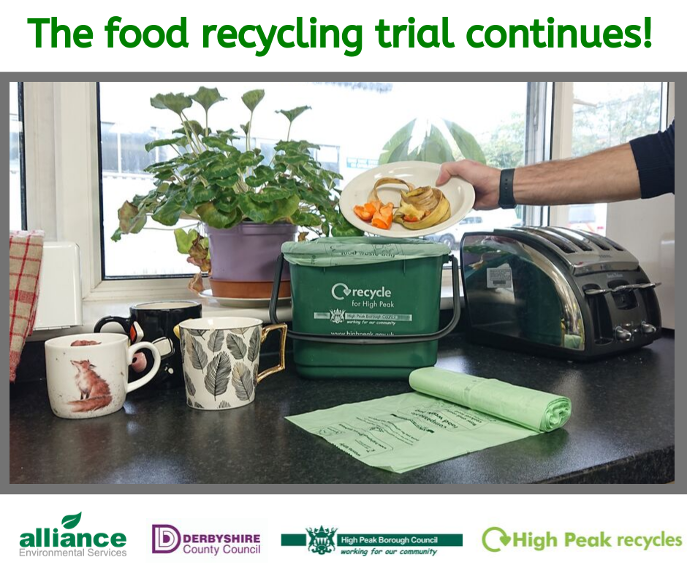Food recycling trial extended in High Peak

The food recycling trial in parts of Buxton and Glossop - which sees three tonnes of food waste per week turned into compost - has been extended until Spring next year.
High Peak Borough Council and waste collection partner Alliance Environmental Services are working with Derbyshire County Council to run the trial with 14,000 households.
The scheme provides free compostable liners to residents to encourage them to separate food waste from general waste and put it in their green-lidded bin. It has been extended to enable more monitoring to be carried out before consideration is giving to including more areas of the Borough.
Deliveries of the liners will begin in the Buxton trial area today (Monday 7 October) with households in Glossop receiving their supply next week.
The compost made from food waste is used as a soil improver for local fields rather than being send to landfill.
Councillor Jean Todd, Executive Councillor for Climate Change, Environment and Community Safety, said: "We really appreciate the efforts residents are making to help improve our environment by recycling their food waste.
"About a third of all waste collected in the black general waste bin is recyclable food waste which could have been turned into compost but instead has been sent to landfill where it creates methane as it breaks down - methane is 30 times more damaging than carbon dioxide when it comes to climate change.
"We want to see that volume reduced but we can only achieve that with your help. Anyone living in High Peak can recycle food waste in their green-lidded bin - you don't need to live in the compostable liner trial areas - but the trial means we can measure the amount of waste food being recycled in the participating areas compared to everywhere else."
Councillor Simon Spencer, Derbyshire County Council's Cabinet Member for Highways, Transport and Infrastructure, added: "It's really encouraging that this scheme has worked so well and we're able to extend it.
"We're always looking for ways to make recycling and composting easier for residents and this is a good example. Separating food waste for composting is good news for the environment and will help reduce the £7.5m cost per year to Derbyshire council tax payers in waste disposal fees."
Residents can put tea bags, coffee grounds and fruit and vegetable peelings into their compostable food bags as they cook and, when they've eaten, scrape any unwanted scraps and leftovers in there too.
There's more information about food recycling on our website www.highpeak.gov.uk/foodwaste
For tips and tricks on how to reduce food waste visit www.derbyshire.gov.uk/50ways where there's also a quiz to test your food waste knowledge!




